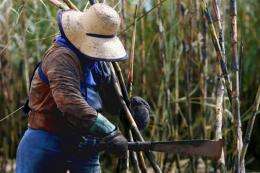Sugar cane to return to Angola in biofuel move

Angola will begin planting sugar cane for the first time in more than 30 years this month as the oil-rich country takes its first step toward biofuels.
A 30,000 hectare (74,000-acre) site in Malanje province, hundreds of kilometres (miles) east of Luanda, is the first biofuel project to get off the ground in Angola where the government is trying to revive farming after decades of war.
The scheme is also part of efforts to diversify the economy away from its dependence on oil and diamonds, which have powered a post-war boom since Angola's civil conflict ended in 2002.
"This is a very important project for our country," said Rui Gourgel, president of Biocom, the company behind the 220-million-dollar (155-million-euro) project.
"Sugar used to be made in Angola before independence, now it is 100 percent imported, but soon Angola will have locally-produced sugar again," he told AFP.
"We are re-launching agriculture, decentralising the industrial sector away from the capital Luanda into the interior, making jobs and creating new areas of knowledge and training," Gourgel said.
The scheme is a joint venture between Angola's state oil company Sonangol, Brazilian construction firm Odebrecht and private Angolan group Damer.
Gourgel said the project will have its own processing plant and produce 280,000 tonnes of sugar plus 30,000 cubic metres of ethanol from the cane residue.
The leftover fibrous remains from the cane, along with the leaves and waste heat from the sugar processing will be used to produce electricity -- around 217 megawatts a year -- which will be used locally.
Angola is the latest in a line of African countries giving over land to companies for non-food crops, a trend that has raised concerns that rural communities up to the United Nations.
"These type of plantations use a lot of land," said Sergio Calundungo, director of Angolan group Action for Rural Development and Environment, (ADRA).
"We need to be sure local people won't be left competing for land and resources like water."
The UN's Food and Agriculture Organization (FAO) warned in May that private and foreign ownership of African farmland was threatening access to water, food and other natural resources.
Public frustration at a South Korean farm project in Madagascar was one of the sparks behind the protests that toppled the government there in March.
Angola currently has no law governing biofuels or regulating how land can be used in such projects.
Draft legislation is going through parliament but the outcome remains uncertain -- meaning the ethanol produced by Biocom for now cannot be used in cars but will instead provide an industrial product.
Gourgel said the company was prepared to start biofuel production if the law changed.
"The technology is the same, we would only need to change some equipment; we are prepared," he said.
Calundungo called for a "full and open debate" on the new legislation, drawing opinion from rural communities as well as the central government and the businesses behind the investments.
Meanwhile, other companies are waiting for the green light to begin similar projects.
Portuguese firm Quifel Natural Resources has waited over a year for the go-ahead to start planting sunflowers, soya and jatropha in the southern province of Cunene.
With similar plantations in Brazil, Spain, Portugal and Mozambique, the company plans to harvest locally but export the crop to Europe for processing.
"There's a lot potential in Angola for these crops," said biofuels analyst Kholofelo Maele of Frost & Sullivan consultants in Cape Town.
"But it's key the legislation is right and that Angola learns from the mistakes of other countries where there have been land conflicts over biofuel production," Maele told AFP.
(c) 2009 AFP

















